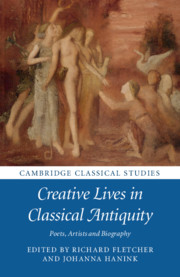Book contents
- Frontmatter
- Contents
- List of contributors
- List of illustrations
- Part I Opening remarks
- Part II Reviving dead poets
- 3 Close encounters with the ancient poets
- 4 Recognizing Virgil
- Part III Lives in unexpected places
- Part IV Laughing matters and Lives of the mind
- Part V Portraits of the artist
- Works cited
- Index
4 - Recognizing Virgil
from Part II - Reviving dead poets
Published online by Cambridge University Press: 01 December 2016
- Frontmatter
- Contents
- List of contributors
- List of illustrations
- Part I Opening remarks
- Part II Reviving dead poets
- 3 Close encounters with the ancient poets
- 4 Recognizing Virgil
- Part III Lives in unexpected places
- Part IV Laughing matters and Lives of the mind
- Part V Portraits of the artist
- Works cited
- Index
Summary
credimus? an qui amant, ipsi sibi somnia fingunt?
Virgil, Eclogue 8.108Lascia parlare a me, ch’ i'ho concetto
ciò che tu vuoi
Virgil's words to Dante, Inferno Canto 26.73–4The idea of recognition can connote respect as well as identification based on previous encounters. When it comes to recognizing Virgil, deference to the poet is very evident in the practices and behaviour of his early readers, along with forms of personal recognition. The title of the present chapter is meant to hint at Virgil's stature, as well as to suggest that by taking a different route, we can see a different side to the poet we have known all along. This can be done by exploring the ways in which other Latin authors seem to regard Virgil as a constructed character in his own poetry. In other words, the aim here is to consider the importance of the poet's individual presence in the performance and reception of his work: Virgil's reception can be shown to be closely connected to constructions of his biography.
These considerations have been prompted by an apparent consensus between some earlier Roman responses to Virgil and the traditions of commentary on the poet from later in antiquity. The earlier sources, which show an interest in the development of Virgil's work over time, often convey a strong sense of the poet's character. The later material presents Virgil as an instructor – of poetic technique, of rhetoric and sometimes of philosophy as well. He is regarded as someone who composes to be heard as well as read. The role ascribed to the poet by his ancient readers amounts to a dramatic role.
It is still customary to treat the words of the Georgics as those of Virgil's individual persona, and some people still conceive of one or two speakers in the Eclogues as mouthpieces of the poet. But the manner in which most readers today seem to approach the Aeneid is what gives the game away. The heroic epic is routinely regarded as presenting a window which looks directly on to the events, characters and historical concerns of the story.
- Type
- Chapter
- Information
- Creative Lives in Classical AntiquityPoets, Artists and Biography, pp. 75 - 100Publisher: Cambridge University PressPrint publication year: 2016
- 2
- Cited by



